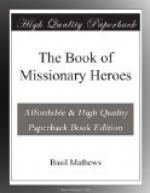M’tesa was gracious to Mackay, and gave him land on which to build his home. More important to Mackay than even his hut was his workshop, where he quickly fixed his forge and anvil, vise and lathe, and grindstone, for he was now in the place where he could practise his skill. It was for this that he had left home and friends, and pressed on in spite of fever and shipwreck to serve Africa and lead her to the worship of Jesus Christ by working and teaching as our Lord did when on earth.
One day the wide thatched roof of that workshop shaded from the flaming rays of the sun a crowded circle of the chiefs of Uganda with their slaves, who loved to come to “hear the bellows roar.” They were gazing at Mackay, whose strong, bare right arm was swinging his hammer
“Clang-a-clang-clang.”
Then a ruddy glow lit up the dark faces of the watchers and the bronzed face of the white man who in the centre of his workshop was blowing up his forge fire. Gripping in his pincers the iron hoe that was now red-hot, Mackay hammered it into shape and then plunged it all hissing into the bath of water that stood by him.
Hardly had the cloud of steam risen from the bath, when Mackay once more gripped the hoe, and moving to his grindstone placed his foot on the pedal and set the edge of the hoe against the whirling stone. The sparks flew high. A murmur came from the Uganda chiefs who stood around.
“It is witchcraft,” they said to one another. “It is witchcraft by which Mazunga-wa-Kazi makes the hard iron tenfold harder in the water. It is witchcraft by which he sends the wheels round and makes our hoes sharp. Surely he is the great wizard.”
Mackay caught the sound of the new name that they had given him—Mazunga-wa-Kazi—the White-Man-at-Work. They called him by this name because to them it was very strange that any man should work with his own hands.
“Women are for work,” said the chiefs. “Men go to talk with the King, and to fight and eat.”
Mackay paused in his work and turned on them.
“No,” he said, “you are wrong. God made man with one stomach and with two hands in order that he may work twice as much as he eats.” And Mackay held out before them his own hands blackened with the work of the smithy, rough with the handling of hammer and saw, the file and lathe. “But you,” and he turned on them with a laugh and pointed to their sleek bodies as they shone in the glow of the forge fire, “you are all stomach and no hands.”
They grinned sheepishly at one another under this attack, and, as Mackay let down the fire and put away his tools, they strolled off to the hill on which the King’s beehive-shaped thatched palace was built.
Mackay climbed up the hill on the side of which his workshop stood. From the ridge he gazed over the low-lying marsh from which the women were bearing on their heads the water-pots. He knew that the men and women of the land were suffering from fearful illnesses. He now realised that the fevers came from the poisonous waters of the marsh. He made up his mind how he could help them with his skill. They must have pure water; yet they knew nothing of wells.




